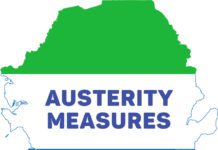By Mahmud Tim Kargbo
The current Bio-led SLPP government in Sierra Leone has allowed political patronage to find its way into our public service thus ‘partializing’ the sector, an embarrassing reality. Before Bio came to power on 4th April 2018, he promised a small and effective government. On that premise, the general public expected the administration to effect the famous rightsizing and downsizing policy as promised during his campaign before he assumed governance. The policy was precipitated by the fact that the public service has been overstocked by its predecessor in comparison to the nation’s revenue envelope. Obviously, political patronage resulting from years of civil upheaval, interim arrangements, and bad governance was the culprit.
If it was implemented by the Bio-led SLPP government, the measure would have drastically cleared the government payroll of employees with duplicate and sometimes triplicate functions and other alleged ghost names. Following what was supposed to be the arguably successful implementation of the measure, civil servants would have begun to witness a gradual increment in their wages in addition to its timely arrival as opposed to what’s going on currently. However, the size of the public service began to grow again. Without any doubt, Mr Bio had to pay his quota of political patronage. By the close of 2018, the government’s wage bill had increased by more than Le 74.8 billion (US $7,731,266.15) to a whooping Le 235.2 billion (the US $24,310,077.52) compared to 2017 from around Le 160.4 billion ($21,386,666.67) (Source: Government supplementary budget 2018), because the rightsizing and downsizing measures weren’t effected. Alleged ghosts increased on government payroll and functions became duplicated. Today, he can hardly manage to keep the gradual increment and the timely arrival of salaries.
In the Bio led government 2022 budget, the Minister of Finance reiterated to members of parliament of the shared colossal amount of the wage bill from Le 235.2 billion in September 2019 to Le 2.88 trillion (US $24,827,586.21) and it is expected to increase to Le 3.75 trillion (US $32,327,586.21).
It’s important to note that after the inauguration of President Bio’s Administration, the government began to pay in due, its quota of political patronage. Several persons were employed, apparently, as a payback for their services during the campaign or in fulfilment of the promise that they would be absorbed into the civil service. Given the mass employment of partisans and well-wishers into the civil service, the wage bill ballooned. Unfortunately, the country’s resource envelope is shrinking as opposed to the Koroma’s era. In actuality, the shrinking of the resource envelop began in the last three years of Koroma’s regime. The over-bloated wage bill and the shrinking resource envelope has thus posed an economic quagmire and a political dilemma for the current government and the people.
The government is gradually backpedaling into the abyss of salary delay while the economic situation gets tougher. Worst of all, under-performance is at its peak and productivity is responding to the Law of Diminishing Marginal Productivity of Labour.
The Law of Diminishing Marginal Productivity of Labour is an economic principle, which postulates that if one input in the production of a commodity is increased while all other inputs are held fixed, a point will eventually be reached when the same input would yield progressively smaller output, which further leads to inefficiency and less productivity. It is no argument that government offices have been mostly occupied by young and old people who supported and campaigned for the president to be elected as a payback for their contribution to his election; a phenomenon that is not only peculiar to the Bio Administration. Because of mass employments, we now have an underwhelming workforce due to the duplication of functions and the effect of the law of diminishing returns of productivity. Offices that once could take five employees and perform effectively now have ten with practically no work to do.
The government needs to move and find a panacea for this economic imbroglio. The people are clamouring for a solution and the government is obligated to provide one. Howbeit, the government is torn between continuing to pay its political patronage quota and allowing the economy to slide into further shambles or disavow the payment of said quota and possibly lose political allegiance and support but ensure increased productivity and viable economic growth.
Compared to most countries in Africa, Sierra Leone’s civil service is one of the largest employers and it is no doubt that our governance system’s absorption of many more persons into the already densely populated civil service is an attempt to further burden the already constrained government wage bill. The recorded upsurge of US $11,172,186.21 to the wage bill of FY 2020/21 leaves us in a space of uncertainty as to what we should expect in the FY 2021/2022 budget. Factors that spur growth and development in any nation is enhanced human resource development; so, it is no doubt that a government’s investment in human resource development would spur growth towards the right trajectory in terms of the development of a country.
Managing public service will lead us to determine whether the current number of employees in the public sector is needed. The effort will ensure that we have answers as to what are the requisite input needed for productive output. With those answers in mind, the hard decision must be made to redundant those excess posts. The occupants of those positions must be enrolled in capacity-building programmes. As indicated by Michael P. Todaro in his book “Economic Development 11th Edition”, Health and Education are fundamental to any nation’s development and that increased income cannot be regarded as a sufficient condition for development. Many development experts also share Todaro’s assertion of education spurring the development of a country. Thus, the effort of building human resource capacity is important.
Some of the redundant employees should be trained in other countries at the expense of the government and bilateral partners through a competitive and transparent recruitment process. Others should be placed in localised professional programmes (i.e., TVET Programs: MVTC, LOIC, and BWI) to build their capacity. These measures would afford the government the ability to run effectively and efficiently as well as build the necessary human resource capacity required for national growth. During the time of this process, the efficient government will have created additional opportunities that will require the expertise of the newly trained. Some of those trained will also be able to find a path in the private sector that can serve as an effective cushion for the government. It is high time the government realises that, employing the youth into government to get income is only sufficient for the short run as it doesn’t guarantee sustainability as many of the young people are not fully prepared for the job market or are not prepared at all. Sierra Leone needs these people more than a regime needs them.
Additionally, the government must move to build and support an active private sector that in turn supports the government. The over bloating of the wage bill will be inevitable until we see a vibrant private sector. A private sector that is controlled by Sierra Leoneans can rise to the height necessary for creating a strong and vibrant private sector that is capacitated enough to support the government’s programmes and policies. The government needs to listen to the plights of the private sector, support and subsidise them. Nevertheless, the private sector must be held to the highest standard of accountability. It is only with such accountability that they will strive to grow and become vibrant.
A vibrant private sector, a productive and efficient public sector, a cost-effective wage bill are the brainchild of an educated, healthy and professional citizenry, no doubt.



